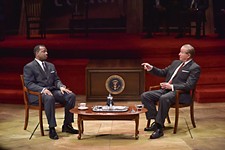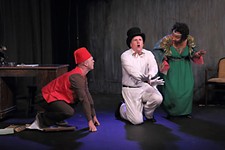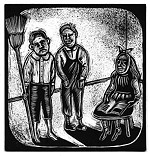One Flea Spare
Local Arts Reviews
Reviewed by Ada Calhoun, Fri., Nov. 24, 2000
One Flea Spare: Burning Down the House
The Off Center,
Through December 2
Running Time: 2 hrs, 5 min
"It is as reasonable to represent one kind of imprisonment by another, as it is to represent anything that really exists by that which exists not." -- Daniel Defoe
Confinement is a favored European metaphor and pastime, and during the bubonic plague the continent hit its enclosing stride. The poor were locked up in "pest-houses," the rich in their vinegar-soaked homes, all in a panicked effort to prevent contamination from a disease no one understood. Reason, imprisonment, and reality-ambiguities pervade this claustrophobic 1995 Naomi Wallace play, produced by new company School of Night Productions, in association with Frontera@Hyde Park Theatre.
Imprisonment is a particularly great device because in times of crisis and cabin-fever hysteria, rules tend to be replaced by a surreal, law-free environment. In Luis Bunuel's seminal film The Exterminating Angel, party guests say their goodbyes and then find themselves strangely unable to leave the house. Days pass. Once they have finished the last of the hors d'oeuvres, their gentility yields to a desperate debauchery. One Flea Spare, echoing Bunuel's film, as well as Albert Camus' The Plague and whatever everyone hoped the TV show Big Brother would be, is the story of unlikely roommates: a staunch middle-aged couple, the Snelgraves, and two young stowaway servants, all trapped in a house in 1665 London at the height of the plague.
The script is poetically crafty, embracing the metaphorical possibility of everything from the caged heart to the free bird, though at times it veers into the distractingly precious, with lines such as "Trust her; she's a liar," and "Everyone leaves, even when they stay." Still, Wallace is redeemed by her firm grasp on the morbid. Mrs. Snelgrave recalls how her body was burned trying to save her horse after it had caught fire. It was almost beautiful, she says, to see the "horse on fire at full gallop." "We'll all meet in the grave," sings Kabe, the creepy and corrupt house guard, played as deliciously evil by Derek Mudd. Ev Lunning Jr.'s skillfully haughty Mr. Snelgrave even offers a perverse metaphor for poised comportment: "It's like walking across the hands of children."
The line between sex and death is notoriously thin, and the erotic content is suitably high here in the death-house. Bunce, the sexually adept young sailor played by the appealing Ira Bowman, does terrific things with fruit, and eventually with Mrs. Snelgrave, whose repression and wistfulness are nailed by actress Jane Willingham. It's all very romance-novel sexy, which is to say that it plays to a variety of fetishes and fantasies with a minimum of realism and a maximum of titillation. Requesting a sexual favor from the mistress of the house, Bunce begs haltingly, "Will you bring a poor sailor and part-time servant to his crisis?" Morse, the manipulative and complex servant girl played by high school sophomore Katie Van Winkle, lets her toes be sucked in exchange for gastronomical treats from Kabe.
The play's melodramatics might grate on some theatergoers, but Mark Hunter's direction is highly professional and the show moves briskly along; this despite the fact that bodies don't start piling up inside the house until the bitter end. In fact, despite the ominous tone of Hunter's director's note, which makes humorless reference to Wallace's play as a commentary on "rigid class structure and disadvantaged identity groups," One Flea Spare is actually an altogether decent sex-and-death psychodrama, and the high caliber of this production an altogether auspicious beginning for School of Night Productions.










